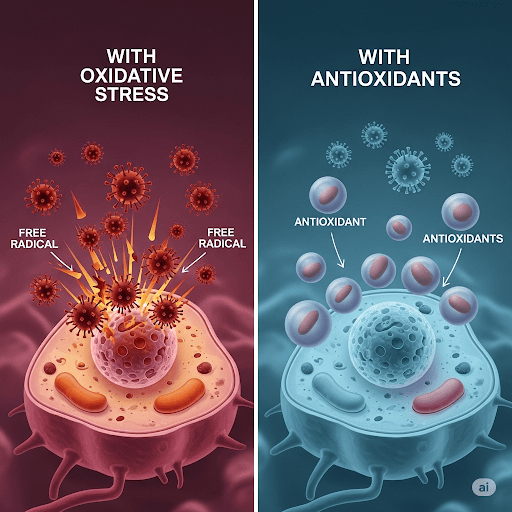Every single day, your pet’s body is engaged in a silent, invisible battle. It’s a natural conflict happening at a microscopic level, but one that can accelerate the aging process and contribute to a host of health issues. The aggressors in this battle are unstable molecules called free radicals.
But your pet is not defenseless. They have a powerful internal security force working around the clock to protect them. The heroes of this force? Antioxidants.
This article will introduce you to these essential nutrients, explaining how they work as your pet’s personal "cellular bodyguards" and why they are so vital for supporting their immune system, promoting healthy aging, and ensuring long-term health.
Understanding the Enemy: Free Radicals and Oxidative Stress
To appreciate the hero, you must first understand the villain. What are free radicals? They are highly reactive, unstable molecules that are a normal byproduct of life itself. They are created when your pet’s body turns food into energy, during exercise, and through exposure to environmental factors like pollution, pesticides, and UV rays.
Think of a free radical as a rogue pinball, bouncing wildly through the delicate machinery of your pet’s cells. As it careens around, it can damage everything it hits—cell membranes, vital proteins, and even the DNA within the cell's nucleus.
When the number of these rogue pinballs overwhelms the body's ability to control them, it leads to a state called oxidative stress. This imbalance is a key factor in cellular aging and is linked to a wide range of health problems, including inflammatory conditions, cognitive decline, and a weakened immune system. This is what makes managing oxidative stress in dogs and cats so important.
The Hero's Role: How Antioxidants Neutralize the Threat
This is where your pet’s bodyguards step in. An antioxidant is a special type of molecule that can safely interact with a free radical and neutralize it, stopping it from causing further damage.
Using our pinball analogy, the antioxidant is the catcher's mitt. It swoops in, catches the rogue ball, and takes it out of play before it can break anything else. It does this by donating one of its own electrons to the free radical, stabilizing it without becoming unstable itself.
While your pet's body can produce some antioxidants on its own, it heavily relies on a steady supply from their diet. The most powerful team of antioxidants for pets includes:
- Vitamins: Vitamin E and Vitamin C are among the most potent antioxidants.
- Minerals: Selenium and zinc are minerals that are essential components of the body’s own antioxidant enzymes.
- Phytonutrients: These are natural compounds found in plants, such as carotenoids (which give carrots and sweet potatoes their color) and flavonoids (found in fruits like blueberries and cranberries).
A diet rich in a variety of antioxidants provides a more robust defense system. Our meal planner app features recipes that go beyond the minimum requirements, incorporating ingredients naturally rich in these cellular protectors, like fish oil (for Vitamin E), carrots, and berries. This ensures your pet gets a diverse ‘bodyguard team’ working around the clock.
Who Needs Antioxidants Most?
While all pets need a constant supply of antioxidants, some life stages and lifestyles require an even stronger defense force.
- Senior Pets: As pets age, their natural production of antioxidants can decrease, just as the cumulative damage from free radicals increases. Extra antioxidants are crucial for supporting their brain health, joints, and immune system.
- Active and Working Pets: High levels of physical activity generate more free radicals. These pets need more antioxidants to help combat muscle fatigue and support cellular repair.
- Sick or Stressed Pets: Illness, surgery, and even emotional stress can dramatically increase oxidative stress, making a diet rich in natural antioxidants for cats and dogs vital for recovery and immune support.
(Senior pets have unique needs beyond antioxidants. Discover more in our guide, [Senior Pet Care: Nutritional Needs of Your Aging Dog].)

Conclusion: Building a Strong Cellular Defense System
Antioxidants are your pet's essential, front-line defense against the daily wear and tear of life at a cellular level. By neutralizing damaging free radicals, they protect cells from harm, support a resilient immune system, and promote a healthier, slower aging process.
You can help fortify your pet’s cellular bodyguards by feeding a high-quality, complete diet that is rich in natural sources of antioxidants. Look for ingredients like fish oil, vitamin E, selenium, and colorful fruits and vegetables.
Give your pet the gift of a strong cellular defense system. Talk to your veterinarian about the role of antioxidants in your pet's diet, especially as they age or if they are highly active. Use our meal planner to build a diet that provides a powerful team of bodyguards in every meal.


